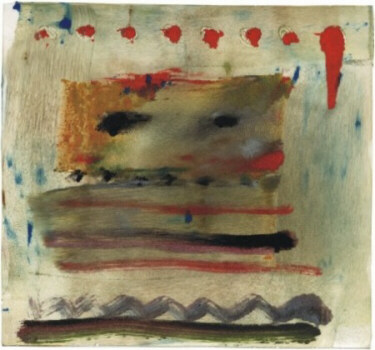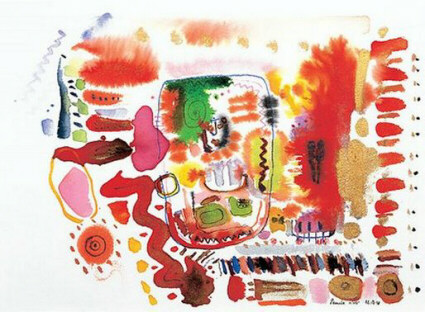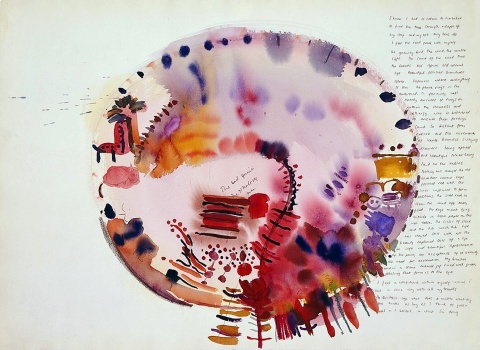 My hard drive and motherboard crashed. If you have experienced this breakdown of the extension of your memory, these tools which hold your information, you can feel with me how the invisible means of support of the cyber-world can be suddenly taken from you. This can give one a moment of computer-related depression — and a grieving for the now-forever-lost files you failed to back up. And as you remember what you have lost, you want to do what you can to restore everything to the status quo ante quem so that your life may continue uninterrupted. And some of us try to do just that.
My hard drive and motherboard crashed. If you have experienced this breakdown of the extension of your memory, these tools which hold your information, you can feel with me how the invisible means of support of the cyber-world can be suddenly taken from you. This can give one a moment of computer-related depression — and a grieving for the now-forever-lost files you failed to back up. And as you remember what you have lost, you want to do what you can to restore everything to the status quo ante quem so that your life may continue uninterrupted. And some of us try to do just that.
But imagine you had an old version of Windows, or DOS, or system 6 Mac, and now as you consider the restoration you can already get a Pentium motherboard, a faster netsurfing modem, and the latest edition of Windows XP, or Mac OS X. In fact you are not merely restoring everything as it was before. You are building a new and broader – even better – platform for your information base.
At the same time, you want to be sure that the new system can handle the old software applications, which you need to re-establish so that the backups will work back in. In other words, your new system has to be downward compatible while being the best you can get together at this time.
In the dimension of time, the workaholic in me is devastated. The frustration and sadness over all the lost data blocks everything but frantic casting about to get it all fixed. But now Shabbat comes and for the next 24 hours, I can’t do very much and I must shift. So as I awaken to dimensions of time beyond the workplace, I can see my weekday calamity in a larger field. Entering in to the world of the Mashal Haqadmoni, the Primal Myth, I begin musing on Jewish History, on the mythic dimensions that hold our world together, and begin to move from Mashal to Nimshal, parable to meaning. Now it seems to me that this has something to do with the process of Tikkun Olam and renewal. To permit a pun, the digital world of the computer became for me a great analogue.
* * *
My first computer, with the awesome memory of 36 K and a cassette tape drive to save the data, was a revelation for me. Now, word processing software had the power to take the written Torah of paper and ink and make it flexible — soft-ware — as if it were Oral Torah. The mind of the computer freed me from the fundamentalism of the script once written. Once, working with paper meant a messier page for every round of editing. Now, each time I corrected copy on that primitive word processor it looked cleaner and better than before.
The came my experience with an Apple II+, and PRODOS. Now I could put in more memory and cards that could do all sorts of things I never could do before. I could now use peripherals that had formerly been out of bounds. My capacity for data — da’at — would be larger than before. But taking the files from my old 36 K Exidy Sorcerer (that was its name) was not easy. Emulation was cumbersome since the file formats were not compatible. Eventually I succeeded, although emulation is never an exact replica.
 I see the aptly-named Sorcerer as an analog for pre-patriarchal Judaism — what we used to call paganism: Chaldean, Egyptian and Canaanite religion. With Abraham and Moses we got to Apple’s PRODOS. Many programs that worked before were incompatible with ours. With others, the work of emulation caused the new computer to crash. The deeds of the land of Egypt which you have left, and those of the land of Canaan which you are about to enter — these you are not to do.
I see the aptly-named Sorcerer as an analog for pre-patriarchal Judaism — what we used to call paganism: Chaldean, Egyptian and Canaanite religion. With Abraham and Moses we got to Apple’s PRODOS. Many programs that worked before were incompatible with ours. With others, the work of emulation caused the new computer to crash. The deeds of the land of Egypt which you have left, and those of the land of Canaan which you are about to enter — these you are not to do.
Eventually, however, PRODOS also became obsolete. It couldn’t handle the new applications coming from Greece and Rome, with their graphical user interfaces and, of course, the mouse. Even before the crash of the Second Temple, the old Sadducean PRODOS had become corrupted, and suddenly there was a new system on the block: MS-DOS, the Pharisaic OS now locked in a Kulturkampf for who would control the shared and common standard. The end or co-option of the line of priests (Jobs and Wozniak) ensured that the Pharisees would prevail.
Who could resist the lure of MS-DOS — Emmes-Dos (Emmet Dat in Sephardic pronunciation), truth and religion? Once learned, it proved much more flexible than either the Exidy’s CPM or Apple’s PRODOS. New manipulations of text and data as well as communication were now possible, and da’at was more portable than before. At the same time, the lingo was neither intuitive or accessible. This was the Talmudic era of my computer life, the time of the rabbinic hegemony, and now there were things I never could do myself. I needed a maven, a meivin, someone who understands — in short, a computer rabbi, to steer me through the shoals of error messages. The Halakhah of the software incompatibilities that froze my computer had to have its dairy and meat separated. I needed a virus detector to keep my drive – the bayit of my bytes — kosher. And every year, at least twice – before Rosh Hashanah and before Pesach — I needed to delete old obsolete files and clean up my drives.
====
And there were different alternatives on how to do that. Amiga, Atari – there were many systems that tried to gain ground within Judaism, but eventually went their separate ways. Yet we remained faithful, staying with MSDOS on our PC clones, added Gaonic enhancements, database managers like the Shulhan Arukh, theological spreadsheets to Guide the Perplexed, Midrashic word processors, capable of making a variety of PARDES formats.
Taking the files from the past and installing them in the new environment became increasingly easier. Luckily, Windows 3.1 could be patched on to MSDOS and that still was Kosher. This is how Orthodoxy has managed to claim that it made only an update (hiddush) and not a change (shinnui). And look what riches it has produced! ArtScroll alone has given us access in English to immense treasures from the past.
But the strongest competition with the PC Clones came with the Lisa and the Macintosh, both with ever more powerful graphics learned from the Greek philosophers and artists, and with simpler user interfaces than Windows. Now between what you see and what you get there was no longer a chasm. Things were made user friendly, even if you couldn’t go behind the scenes, as it were, to tinker with the code. Many PC users made the switch.
 In response, most PC’s became as GUI as the Mac. This is how I see the Baal Shem Tov and Hasidism. At first, there was resistance to the intuitive, embodied mouse and the other user-friendly (subject-centered, anti-authoritarian) innovations. But eventually, even the Mitnagdim, who opposed Hasidism and claimed that their new way was an unlawful deviation from the common Emmes DOS standard, sought to have a version of Windows that would open their platforms to a graphic interface. Still, there are many today who still prefer black and white to color.
In response, most PC’s became as GUI as the Mac. This is how I see the Baal Shem Tov and Hasidism. At first, there was resistance to the intuitive, embodied mouse and the other user-friendly (subject-centered, anti-authoritarian) innovations. But eventually, even the Mitnagdim, who opposed Hasidism and claimed that their new way was an unlawful deviation from the common Emmes DOS standard, sought to have a version of Windows that would open their platforms to a graphic interface. Still, there are many today who still prefer black and white to color.
* * *
Today I can do so much with my computer, that each time there is a crash, I face a Hurban, a destruction and a rebuilding. And each time I upgrade, with the new system installed and more memory added, there comes the work of sifting through the backups to see which of the old files are needed on the new drive, and which are to be kept as backup archives, no longer relevant to what comes next. I need to decide which of the old text files will be of use to me. I need to make a birrur hanitzotzot, a sorting of the sparks and releasing them from their qlippot, their shells. I have to keep my virus alert on to keep from contaminating the new drive. Oy… how will I get all the lost addresses back, and the e-mail contacts. I have to start some things from scratch.
I see in the Holocaust the most recent crashing of our hard drive. Since that time we have all been frantically rebuilding the old files, some insisting that we restore our system to the standard of the old pre-holocaust motherboard, others willing to update as long as they maintain at least the semblance of still using the EmmesDos. What file-management system should we use? Which files can we no longer open — and which do we not want to open?
In Jewish Renewal we have opted for the RISC (Reduced Instruction Set Computing) processor. It offers a simpler, more intuitive and user friendly interface, one that is graphic and allows for right brain lateral and fuzzy thinking. It’s a system that gives you fewer error messages. But RISC is risky, as it lacks the ability to understand many of the old files and thus may be unstable.
And there is always the danger of shevirat hakeilim when a file that is too large for our computer crashes our system. We need to periodically upgrade if we want to load in the files of Kabbalah, as our email clients can be compromised by large attachments. We need Adobe and other cross-platform software to read files from other religions, because the formatting is lost if we simply cut and paste.
And now there is open source — Linux and other operating systems that might provide a system that is accessible to all, and which does not give too much power to Bill Gates and his cronies. Of course those in power resist this change, as it threatens their hold on the computing universe. They force us to use their word processors, their email programs, as a way of keeping us within the Windows fold. They make it difficult to operate with a different standard, even though their system still crashes more. So only a few on the fringe use Linux, with their new and still-awkward desktop software. But perhaps somewhere in the future, there still waits a global standard UNIX. On that day the peaceable Kingdom will have arrived, all sharing one standard for global communication and compatibility. Bimheir’a b’yameinu.








I’m impressed, I have to admit. Actually rarely can i encounter a blog that’s both educative and entertaining, and without a doubt, you’ve got hit the nail to the head. Your concept is outstanding; ab muscles an issue that not enough people are speaking intelligently about. I will be delighted that we stumbled across this within my seek out something about it.
Hey, maybe this is a bit offf topic but in any case, I have been surfing about your blog and it looks really neat. impassioned about your writing. I am creating a new blog and hard-pressed to make it appear great, and supply excellent articles. I have discovered a lot on your site and I look forward to additional updates and will be back.
This is a really good blog. Thanks for the info.
Thanks for the great post on your blog, it really gives me an insight on this topic.:~’:’